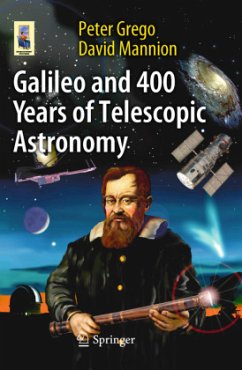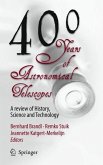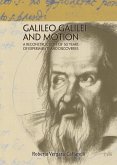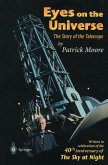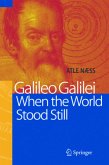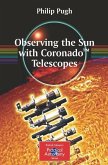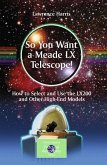In 1609 Galileo first used his telescope to kickstart the science of observational astronomy - an event that proved to be of enormous historic, scientific, and cultural importance. Galileo and 400 Years of Telescopic Astronomy will feature the life and achievements of Galileo, around which has pivoted the story of four centuries of telescopic astronomy. The book will detail how astronomy has progressed through four centuries and contain glimpses of future space research and astronomy goals. Uniquely, interwoven with the text will be a range of practical projects for backyard astronomers in which to participate, projects that serve to illustrate many of Galileo's scientific discoveries. The year 2009 not only marks the 400th anniversary of Galileo's initial telescopic discoveries, but it has also been chosen as the International Year of Astronomy, perfect timing for the reader to see for him or herself the way Galileo worked and thought.
From the reviews:
"The organization is clear and easy to follow with excellent illustrations. In addition to providing history lessons and details of discoveries throughout the ages ... include several easy-to-do exercises such as assembling and using a cross-staff or making a telescope from common optics (e.g., discarded binocular parts). Several tables of interesting events including close conjunctions or brighter Messier objects offer an incentive for the reader to become an observer. ... Summing Up: Recommended. General audiences." (M. K. Hemenway, Choice, Vol. 48 (7), March, 2011)
"This is an extraordinary book ... . It's really three books rolled into one; a sound historical overview, a practical explanation of the historical observations, and a useful reference ... . skillfully combines aspects of telescopic astronomy in a way that is both very readable and stimulating. ... refreshingly new way to present observational astronomy in its historical context and would be a great introduction to anyone starting out in practical amateur astronomy. It is definitely a must have for school libraries and astronomical societies." (Kevin Kilburn, Popular Astronomy, March-April, 2011)
"This charming book is an easily accessible romp through the history of astronomy, concentrating on what is observable. ... Galileo Galilei is clearly the book's hero. His technical ability to make and improve his own instruments is much admired. ... Grego and Mannion are clearly great fans of the Italian 'father of modern science'. Their delightful book strongly encourages us all to try and follow in his footsteps." (Carole Stott, The Observatory, Vol. 131 (1222), June, 2011)
"Galileo and 400 Years of Telescopic Astronomy is the story of science and civilisation, retold for a twenty-first century audience. ... What makes this book unique is its accessibility. ... the authors warmly encourage you to perform your own experiments.... Grego and Mannion paint an insightful picture that ... wholeheartedly deserves a read. This is a great book and well worth the modest price tag!" (Neil English, Astronomy Now, January, 2012)
"The organization is clear and easy to follow with excellent illustrations. In addition to providing history lessons and details of discoveries throughout the ages ... include several easy-to-do exercises such as assembling and using a cross-staff or making a telescope from common optics (e.g., discarded binocular parts). Several tables of interesting events including close conjunctions or brighter Messier objects offer an incentive for the reader to become an observer. ... Summing Up: Recommended. General audiences." (M. K. Hemenway, Choice, Vol. 48 (7), March, 2011)
"This is an extraordinary book ... . It's really three books rolled into one; a sound historical overview, a practical explanation of the historical observations, and a useful reference ... . skillfully combines aspects of telescopic astronomy in a way that is both very readable and stimulating. ... refreshingly new way to present observational astronomy in its historical context and would be a great introduction to anyone starting out in practical amateur astronomy. It is definitely a must have for school libraries and astronomical societies." (Kevin Kilburn, Popular Astronomy, March-April, 2011)
"This charming book is an easily accessible romp through the history of astronomy, concentrating on what is observable. ... Galileo Galilei is clearly the book's hero. His technical ability to make and improve his own instruments is much admired. ... Grego and Mannion are clearly great fans of the Italian 'father of modern science'. Their delightful book strongly encourages us all to try and follow in his footsteps." (Carole Stott, The Observatory, Vol. 131 (1222), June, 2011)
"Galileo and 400 Years of Telescopic Astronomy is the story of science and civilisation, retold for a twenty-first century audience. ... What makes this book unique is its accessibility. ... the authors warmly encourage you to perform your own experiments.... Grego and Mannion paint an insightful picture that ... wholeheartedly deserves a read. This is a great book and well worth the modest price tag!" (Neil English, Astronomy Now, January, 2012)

